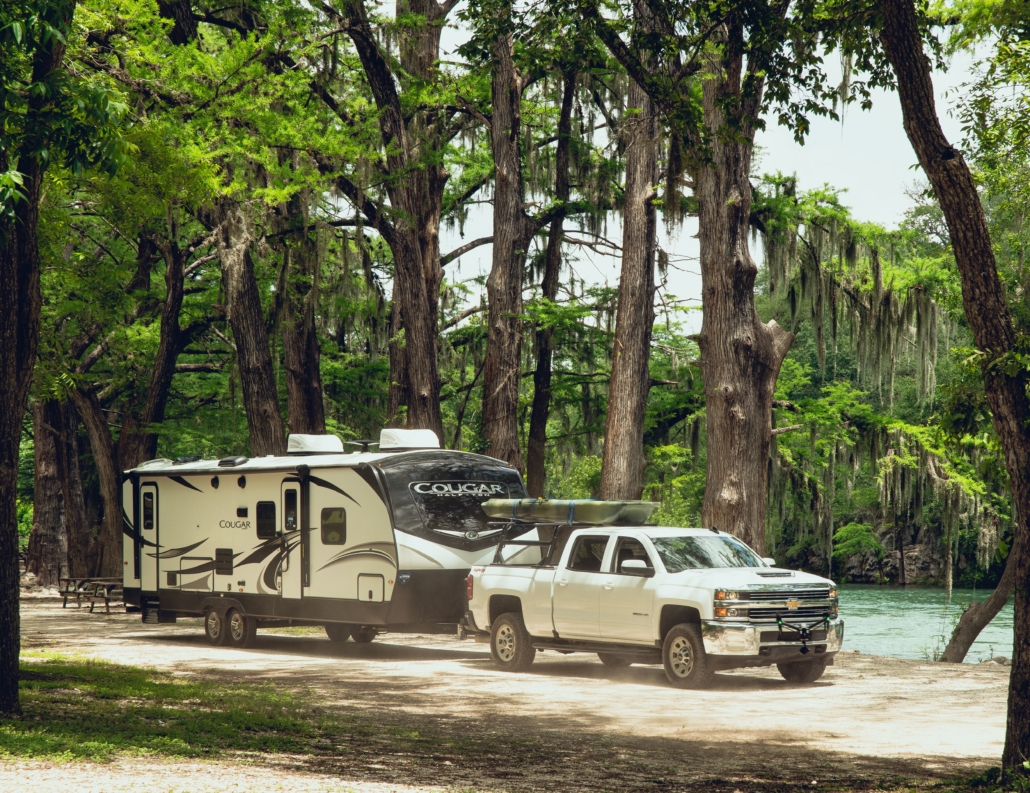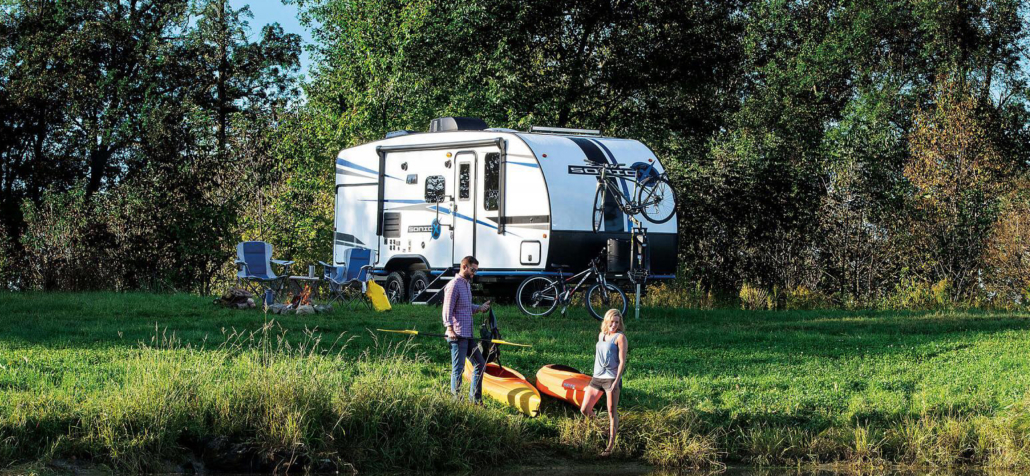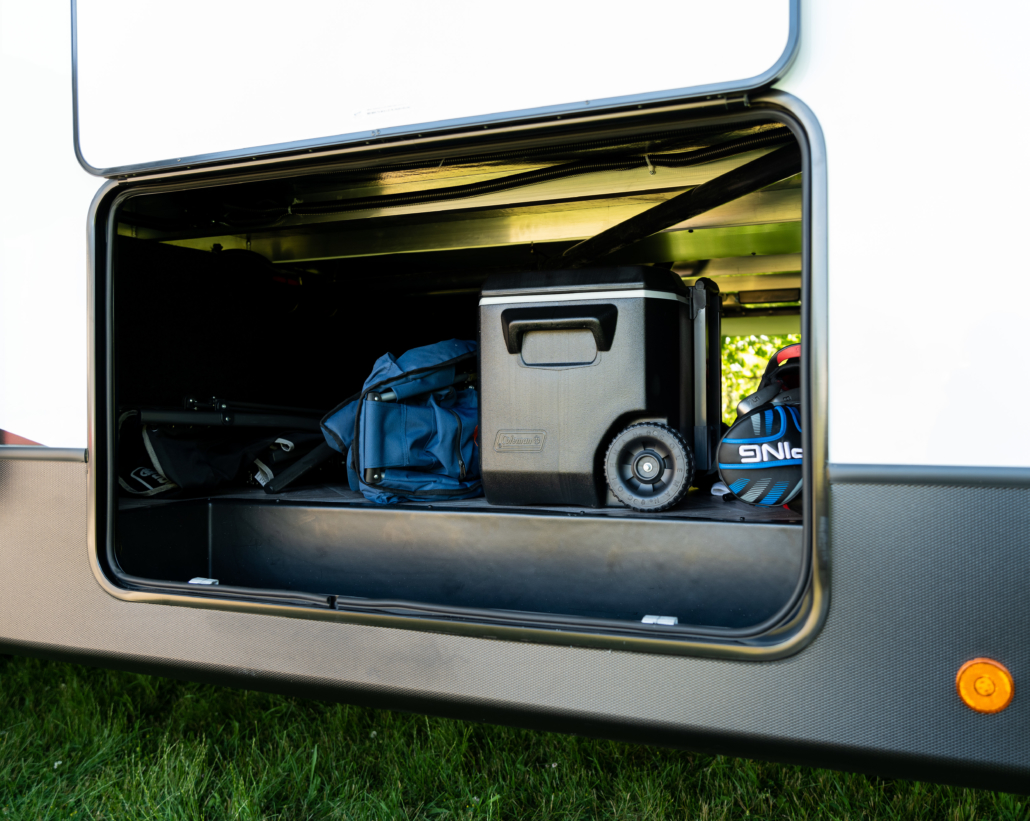The decision to buy a new RV is an exciting one! There are so many fun trips that you can take as soon as you’ve made your purchase and packed up to hit the road. But before you’re ready to travel, you have to find the right RV. Once you start looking at all the different models and floorplans it can quickly feel overwhelming.
There are so many options to choose from. It can be challenging to know where to start and what you need and what you don’t. So, to help you get started, here are four things to look for when you start RV shopping.
1. Your options for towing
The first thing to think about before you start RV shopping is if you have a vehicle that can tow an RV. Now if you plan on purchasing an RV that you keep parked in one spot all the time, you can skip this decision. But if you plan on traveling around with your RV, this is the best place to start.
Do you currently have a vehicle that can tow an RV? While using a pickup truck is the most popular option, it’s not the only one. You can also tow certain RVs with SUVs or even vans, but it’s important to know the limitations of your vehicle.

Take time to research what weight your vehicle can handle towing. It’s recommended that you always try to have a vehicle that can tow more than you actually need it to. Remember, better safe than sorry.
If you don’t currently have a vehicle you can tow with, do you plan on purchasing one? If so, you may want to wait to purchase the vehicle until you know exactly what RV you want. This way you can assure that you get the RV of your dreams and your vehicle is easily able to handle it.
If you don’t own a tow vehicle and don’t want to buy one, this will help direct your decision on what type of RV you’re looking for.
2. The type of rig that you want
Now that you know if you’re looking for a towable RV or a motorhome, you can start looking into the specific type of rig that you want. There are several options to choose from.
Drivable RV
If you’re looking for a drivable RV, you can choose from a Class A, Class B, or Class C.
Class A RVs are the largest RVs and you can choose between gas or diesel. They have large, flat front windshields that provide great visibility as you drive. They generally have multiple slides providing even more living space inside the RV.
It can be nice for passengers to feel that they can get up and move on the road, but if you have children, you need to be proactive about the seatbelt situation. This can become more complicated if you have children that need to ride in car seats or boosters still. Class A RVs usually cost more than other options as well.
Class C RVs are the ones that have the space above the cab. This area is typically used as a sleeping space or storage space. These are smaller than Class A RVs but still give you the option of not needing a tow vehicle.
Class Bs are also known as camper vans. They look just like a van on the outside but provide you with some livable space on the inside. Due to the smaller size of Class Bs, they are limited on the space and amenities you’ll find inside. But for some solo travelers and couples, it’s exactly what they need.
Towable RVs
Towable RVs include fifth wheels and travel trailers. There are many different sizes and floorplans that you can choose from. This makes them a great option for solar travelers all the way up to large families. You can even find floorplans that include two-bedroom set-ups or a room that you can use as an office when working on the road.
While passengers aren’t able to ride in the RV while you’re traveling, you can keep the family safely buckled in your tow vehicle.
3. Where do you want to camp?
The type of RV that is the best first for you can also vary based on where you want to camp. If you’re someone that wants to be in luxury RV resorts, there tend to be minimum requirements that you need to meet. For example, some only allow Class A RVs in the resort.
On the other hand, if you’re more of an off-the-beaten-path type of RVer, you want to find the right RV that is set up for boondocking and handling more difficult terrain.

You’ll also want to consider the climate that you’ll be camping in. Some RVs are rated higher for colder temperatures than others. So, carefully think about what options you want and where you’re interested in staying.
4. Cargo and storage space
The amount of cargo space that you’ll need will depend on your lifestyle, travel desires, and how many people are traveling with you. If you plan on full-time RVing, you want to make sure you have all the room that you need for your belongings. And if you plan on only using your RV on occasion, you still want to think about the amount of space for storage.

But it’s not just about understanding how much space you have to use, it’s about understanding the cargo capacity of your RV. This is the amount of weight that your RV can handle and it includes things like the water in your tanks. If you’re full-time RVing or like to travel with a lot of gear, you’ll likely want to look for 3000 lbs to 4000+ lbs of cargo capacity.
And there you have it. Focusing on these four things will get you started on the right foot during your RV shopping experience. If you have any questions or want help finding the right RV for you and your needs, contact Sky River RV today.
